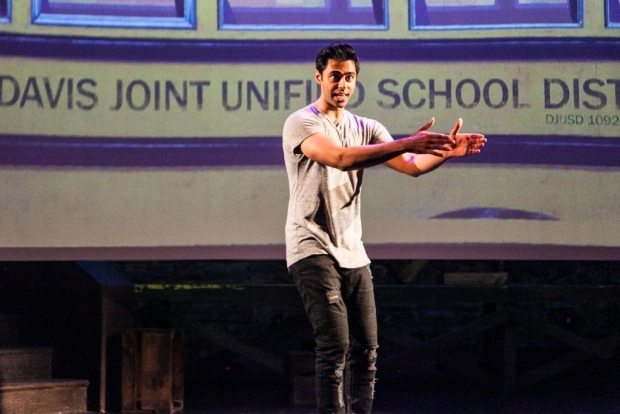

Hasan Minhaj, a correspondent on The Daily Show, is currently performing Off-Broadway in Hasan Minhaj: Homecoming King. The solo show, about Minhaj's experiences growing up in the mostly white town of Davis, California, concludes its sold-out run on November 15, and will return to the Cherry Lane Theatre in January. We recently had the chance to chat with Minhaj, who told us about how he got started in stand-up, why comedians are like "funny attorneys", and the inspiration behind Homecoming King.
When did you know you wanted to be a stand-up comedian?
I was in college and I saw a special called Never Scared by Chris Rock. My university had a really fast internet connection and kids could download everything. I had never really seen stand-up comedy before and then a friend of mine showed me this special and it changed my life, and I thought, I really wanna do that.
How did you go about doing that, working on your craft, since you’d never seen stand-up before?
One of the first things I started doing was going to open mics in Northern California – Sacramento and San Francisco. It was beneficial that the first years I started doing comedy, I was in college. And that helped because there’s not a lot of pressure on you when you’re a comedian in college because there aren’t the extra financial burdens on you.
What did you study in college?
Political Science.

Did that influence your comedy at all, since you are also a correspondent on The Daily Show?
To me, stand-up comedy is a hybrid of two things: 1) Jazz – where you are playing off the audience and there’s a tempo and rhythm; 2) Speech and Debate.
Stand-up comedians are essentially funny attorneys. They get up in front of an audience and present a case or an argument using humor. The way you logically break down arguments in political science or law is very similar to what you do in comedy. What drew me to comedy though was that comedians don’t have to bide by any corporate, social or religious lines. They get to say whatever. They are not speaking for any specific party. They are kind of the bystanders watching everything happen and saying, "Are you noticing this too?"
What struggles have you faced as an artist from a minority community?
The biggest struggle in show business and Hollywood is that a lot of projects that are created are not written or created by people of color, but I became a huge beneficiary of a lot of great artists who came before me and became very successful, people like Russell Peters, Aziz Ansari and Mindy Kaling. Those people made it possible for me to do what I am able to do. I think things are changing and things are changing for the better.
What inspired you to write Homecoming King, and what was the process of putting your own stories on paper like?
I felt really embarrassed by a lot of the stories, especially the prom story, and I thought no one would really find it important or valuable. I didn’t see any reason why anyone would care. On a whim, I told the prom story at a Moth Story Slam in Los Angeles, and even though I lost the slam, the artistic director told me, "It’s really important what you’re saying and you should continue to work on it." I met up with my director, Greg Walloch, and started fleshing out the stories. That was the genesis of me working on it and developing it and making it a full show.
How long did that take?
It took one and a half years to write. And the show itself is living and breathing. Things happen that allow us to continue the narrative. The show is still developing and I keep learning new things. Bethany literally came to the show last night. [Bethany Reed is the real-life person upon whom the character of the same name is based in Homecoming King; she invites Hasan to prom.]
Oh, wow. Really?
YES. Do you see what I’m saying with it’s living and breathing – it keeps changing. What I find now with my marriage and this sort of rite of passage into adulthood, is that it serves as a kind of through line, and allows me to naturally drawing connections to the other stories.
 I do have a question about Bethany. Did you have any qualms about telling her story? How did you negotiate the fact that you’re talking about real people in the show?
I do have a question about Bethany. Did you have any qualms about telling her story? How did you negotiate the fact that you’re talking about real people in the show?
I was afraid of getting up there and lambasting anyone, throwing anyone under the bus. I dealt with a lot of guilt, I mean, I love my family and for me to use them as fodder for “material,” that just didn’t sit right with me. At the same time, I believe that art is the most authentic form of expression and if there is love in my heart for those people, it will come through. Greg told me, "The way I see it, Hasan, and the way audience will see it is you really do care about your family and you’ve shown how you and people around you have changed and grown."
I think it’s the same thing with Bethany. I think what she’s been able to do (without giving away any spoilers) is a testament to the fact that people can change for the better. I hope that when the story ends, people don’t walk away with negative ideas about these people. I think that’s why my director also thought it was important for me to show myself as flawed, too. I think everyone has things in their lives that they wish they could have changed.
How has the response to the show been so far?
I’m just going up there every day and doing the work. I’m trying to convey my authentic experience. If anything falls into tropes or stereotypes, I try to pull it back and address qualms around what I’m talking about.
The coolest thing, though, is to see teenagers – fourteen and fifteen year olds – come to see the show and resonate with it. Seeing them take pictures with the poster, that’s what means the world to me because I’m just trying to create something that I wished existed when I was fifteen.
What’s next for the show?
Our plan is to take it around the country. I think it’s a show worth showing to people, especially to kids that are growing up. We’ve had so many kids come to the show and say, "I want to bring my mom and dad to the show." And I think that’s what is so amazing, people can plug into it from different generational standpoints. So we definitely want to bring it to different festivals and tour it domestically and internationally.
What advice do you have for aspiring artists?
If you’ve ever felt like an outsider or a square, just know that if you build it, they will come. Create what you wish existed in the zeitgeist. Put it out there in the ether. And I think narrative storytelling is one of the greatest things you do. And then you worry less about what other people are saying or doing because you are creating your own opportunities.
Performances of "Hasan Minhaj: Homecoming King" continue through November 15 at Cherry Lane Theatre. The show will return January 7-30.